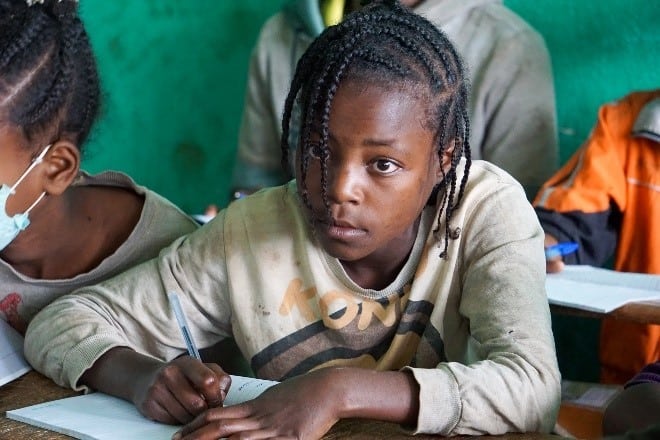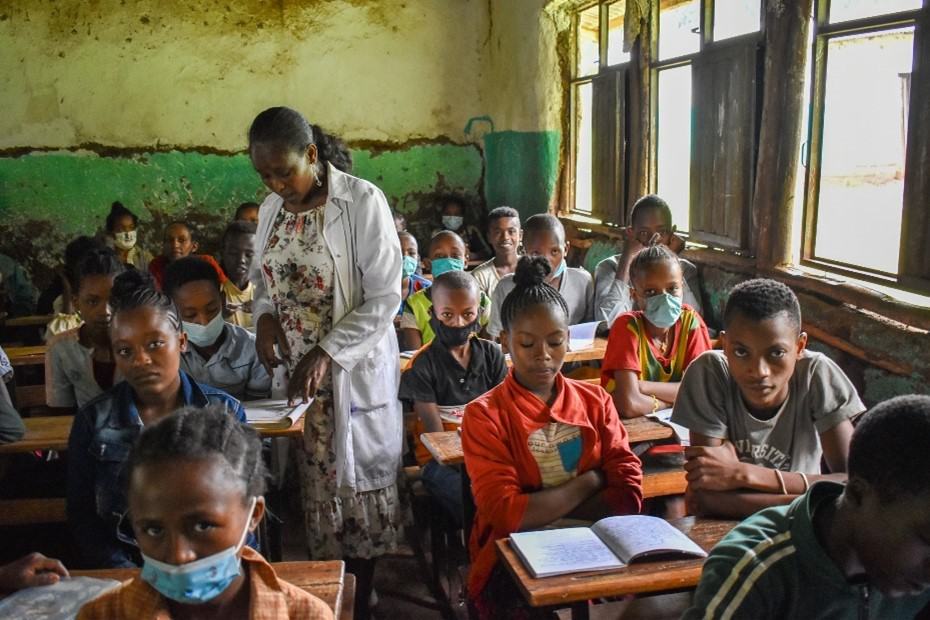READ II Support Improves Reading, Motivates Educators and Students
By Berihun Ali
Odola, Ethiopia–When Tarikua Tesfaye completed the second grade in 2020, she was frustrated. She still couldn’t read, and even struggled to identify the letters and sounds of the alphabet.
She was far from the only second-grade student who couldn’t read in Ethiopia, where a 2016 study revealed that only a third of second and third grade students could read at a functional level.
Today, Tarikua, 11, is now considered one of the best readers in her fourth-grade class, thanks to the support her school and its teachers are receiving from the READ II project. The five-year program funded by the U.S. Agency for International Development supports millions of primary school students in Ethiopia in more than 3,000 target schools in seven regions.
Tarikua’s improvement is a typical example of how students, when supported, can succeed in Ethiopia.
“Cognizant of the challenges from consecutive studies conducted earlier, the USAID READ II project has been implementing a set of interlinked activities to help primary school children learn to read,” says Tassew Zewdie (Ph.D.), the project’s chief of party.
These activities include providing training to mother-tongue and English-language teachers to improve classroom instruction; capacity building of education administrators to better support schools and teachers; providing supplementary reading materials for students who previously didn’t have access, and creating awareness among communities to support children’s reading, he adds.
The Ethiopian government has made it a priority to increase the country’s consistently low literacy rates. To assist the government to address these challenges, READ II seeks to boost the quality of literacy instruction and student support for 15 million children, including those at risk of failure and dropout caused by cognitive, emotional, and physical effects of hunger, violence, and displacement.
Implemented by Creative Associates International, along with its core partners Education Development Center and World Vision, the project works to better equip teachers with effective early grade reading instruction techniques and materials in seven mother-tongue languages and English, while simultaneously building a culture of reading in the school, home and community.
By employing the more student-centered approach, students are engaged and actively participate in the classroom activities and drills. Teachers are trained to identify and group students based on their reading performance using the tools they receive from the READ II training to provide focused support to those who are weak performers.
Tarikua is one of those students who benefited from the focused support, which allowed her catch up to her grade-level reading skills and fall in love with reading.
She now can read well from all the texts in her books as well as the stories in the supplementary reading materials READ II provided to them. “I am excited to start school,” she says. “I feel I am improving my reading and my grades in school, and I want to improve them more in this [academic] year.”
Supporting teachers to help students succeed
Tarikua’s school is in Odola Primary School in the Dara district of the newly established Sidama regional state some 370 kilometers south of the capital, Addis Ababa. The school teaches in Sidaamu Afoo, the mother tongue of the region.
Tarikua’s Sidaamu Afoo teacher, Aregash Demeke, received training from READ II, which helped her to improve her classroom instruction. The mother-tongue teacher is also supported by the school director, cluster supervisor, and mentors, who are all trained by READ II. These all expedite Aregash to deliver better classroom instruction to help students learn reading.
“The training and the successive supports I am getting has completely transformed the way I teach in the classroom,” Aregash says. “I have acquired new skills and employ new methodologies on how I teach students to learn to read and write, to monitor and evaluate them.”

Tarikua’s success shows that students can improve reading with support from their teachers, the community and their parents.
“I have observed remarkable progress on my students’ reading performance after implementing the tools and methodologies I acquire from the READ II training,” Aregash says. “The supports I get from my colleagues, the school director and mentor teachers, as well as the cluster supervisor are very helpful in delivering better to students.”
Though Aregash has been working as a mother-tongue teacher for more than a decade, she never used a teacher’s guide or any other manual as a reference. But after the training, she understood how important such a guide’s use is for students’ learning success. She now uses the teacher’s guides and the manual she is provided at the training in each session.
“We strictly use them alongside the students’ textbook on a daily basis. I also refer them when planning and implementing those plans,” she says.
Aregash plans, executes and evaluates her activities and her students’ performance based on the tools and checklists she acquired from the training.
“The school director, cluster supervisor, as well as my mentor and colleague provide me support on a daily basis, starting from the lesson plan preparation to the evaluation of students,” she says.
The improvements Aregash says she has observed in the past few years in students’ performances—particularly reading skills, are rewarding as well as inspiring and motivating for other students.
When they came to school for the first time after a long summer break, students were excited as they expect to continually improve their performances supported by their teacher, parents and volunteer community literacy leaders, who are supporting them to practice reading in the reading camps established near their village. Tarikua, too, was also excited to come to school like other students.

“The training and the continued support have improved the way I teach students,” says Aregash.
In addition to the support students get from schools, they are also provided an opportunity to practice their reading in a reading park established in their school compound and reading camps established near their village.
In reading camps, students use the facilities usually on the weekends and after school with facilitation support from volunteer community literacy leaders. READ II provided training and ongoing support to volunteer community literacy leaders to facilitate the reading camps session for students to practice their reading.
“In the reading camps there are books we practice after school and over the weekends,” Tarikua says. “I think they have helped me a lot in improving my reading as I also sometimes borrow them to read at home.”
Tarikua wants to be a teacher when she grows up. She wants to support children to learn better and understand new things as her teachers are doing for her.
“I want to be an exceptional teacher when I grow up,” she says. “I want to help students in my community—both boys and girls—to succeed in their education.”
